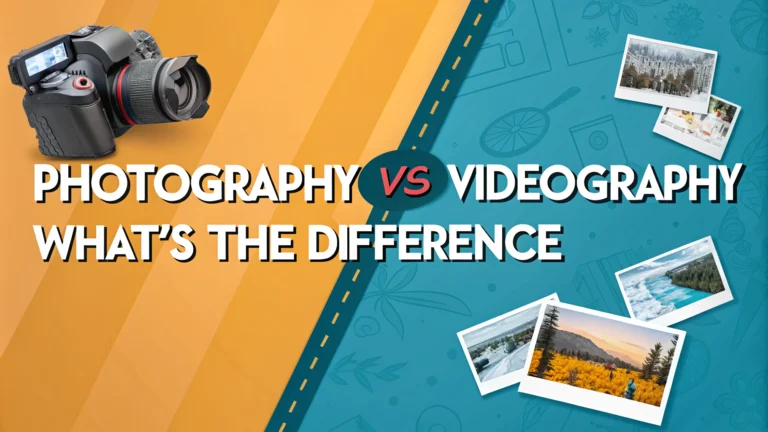While both capture visual stories, **photography** and **videography** require distinct skills and techniques. Understanding these differences helps creators choose their creative path and equipment needs.
Visual storytelling continues to shape how we share experiences and information. The choice between still images and moving pictures depends on your goals, style preferences, and the message you want to convey.
Essential Elements of Photography
**Photography** focuses on capturing single moments in time. The art requires mastering:
- Composition and framing techniques
- Understanding of exposure triangle (ISO, aperture, shutter speed)
- Light manipulation and control
- Post-processing skills
Core Components of Videography
**Videography** involves continuous motion capture and additional technical considerations:
- Frame rates and motion control
- Audio recording and management
- Sequential storytelling
- Advanced editing workflows
Equipment Requirements and Investment
Each field demands specific gear:
| Photography | Videography |
|---|---|
| Camera body | Video camera or DSLR/Mirrorless |
| Prime/zoom lenses | Stabilization equipment |
| Flash/lighting | Microphones and audio gear |
| Memory cards | Large storage solutions |
Technical Skills and Learning Curve
Both fields require unique expertise:
- Photography emphasizes **composition** and **moment capture**
- Videography demands **continuous storytelling** and **motion control**
- Audio knowledge becomes essential for video work
- Different editing software and workflows
> “Photography is about finding something interesting in an ordinary place… It has little to do with the things you see and everything to do with the way you see them.” – Elliott Erwitt
Career Markets and Income Potential
Different markets offer unique opportunities for both fields:
**Photography Markets:**
- Wedding and events: $2,000-$5,000 per event
- Commercial product shots: $200-$1,000 per image
- Real estate photography: $150-$300 per property
- Stock photography: Passive income potential
**Videography Markets:**
- Corporate videos: $1,000-$5,000 per project
- Wedding films: $2,500-$7,500 per event
- Music videos: $2,000-$10,000 per video
- Documentary work: Project-based pricing
Creative Style Development
Each medium allows for unique artistic expression:
**Photography Styles:**
- Minimalist or complex compositions
- Natural or studio lighting techniques
- Black and white or color specialization
- Documentary or staged approaches
**Videography Styles:**
- Cinematic or run-and-gun filming
- Interview-based or observational
- Fast-paced or slow motion
- Music-driven or narrative focus
Business Setup and Client Management
Starting a successful visual business requires:
| Essential Steps | Benefits |
|---|---|
| Portfolio website | Showcases work to potential clients |
| Business insurance | Protects equipment and liability |
| Contracts | Sets clear expectations |
| Pricing structure | Ensures profitable operations |
> “Success in visual arts comes from understanding your market and delivering consistent quality.” – Annie Leibovitz
Making Your Choice
Consider these factors when choosing between photography and videography:
**Personal Factors:**
- Your natural eye for composition
- Comfort with technical equipment
- Time available for learning
- Initial budget for gear
**Market Factors:**
- Local demand for services
- Competition in your area
- Potential earning capacity
- Growth opportunities
The best choice depends on your **personal interests**, **market opportunities**, and **long-term goals**. Many professionals successfully combine both skills to offer comprehensive visual services.
Photography vs Videography FAQs
General Questions
Q: What’s the main difference between photography and videography?
A: Photography captures single static images, while videography records moving sequences of images with audio. Photography freezes moments in time, videography tells stories through motion.
Q: Which is more expensive – photography or videography equipment?
A: Videography typically requires more expensive equipment due to additional needs like stabilization gear, audio recording equipment, and higher storage requirements.
Q: Can photographers easily transition to videography?
A: While photographers understand composition and lighting, they need to learn additional skills like motion techniques, audio recording, and video editing to transition to videography.
Technical & Career Questions
Q: What frame rates are standard for videography?
A: Common frame rates include:
- 24fps – Cinema standard
- 30fps – TV broadcast standard
- 60fps – Sports and action footage
- 120fps+ – Slow motion
Q: Which pays more – wedding photography or wedding videography?
A: Wedding videography typically commands higher rates due to longer editing time, more complex equipment needs, and fewer professionals in the market.
Q: What storage space do photographers vs videographers need?
A: Videographers need significantly more storage space. A 1-hour 4K video can require 100GB+, while a photography session might only need 10-20GB.
Long-tail Keyword Questions
Q: Is it worth hiring both a photographer and videographer for a wedding?
A: Yes, each captures different aspects of the day – photographers capture specific moments and formal portraits, while videographers capture movement, sound, and emotional sequences.
Q: What camera settings are different for photography vs videography?
A: Key differences include:
| Setting | Photography | Videography |
|---|---|---|
| Shutter Speed | Varies widely | Usually 2x frame rate |
| ISO | Can be higher | Needs to be consistent |
| File Format | RAW/JPEG | MP4/MOV |
Q: How long does it take to edit photos vs video footage?
A: Video editing typically takes 3-4 times longer than photo editing. A wedding video might take 30-40 hours to edit, while photos might take 8-10 hours.
Q: Which is better for real estate marketing – photos or video?
A: Both serve different purposes. Photos are essential for listings and detail views, while video tours provide better spatial awareness and flow between rooms.
Q: Do you need different lighting equipment for photography vs videography?
A: Yes. Photography can use flash lighting, while videography requires continuous lighting. Video lights need consistent output and often require more power.



















